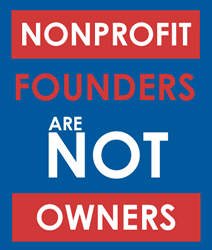Nonprofit Founders: You’re Not a King – But You Can Be a Great Steward

Just because you started the nonprofit doesn’t mean you own it. You’re not a startup CEO cashing in on equity, and you’re not royalty sitting on a throne. Once the ink dries and that IRS letter shows up, the organization isn’t your personal property — it never was.
Sure, the idea was yours. You put in the sweat, maybe emptied your bank account, maybe lived out of your garage to make it real. That’s admirable. But once you become a nonprofit, the game changes. You’re running a public charity, not your personal side project.
Here’s the part most founders miss: that’s not a step down. It’s actually a step up. It means accountability, structure, compliance — and sometimes the guts to get out of the way when the mission needs more than just you. That’s not betrayal. That’s what leadership looks like.
If that makes you bristle, good. It means you care. The founders who actually give a damn are the ones who can take the punch, swallow their pride, and still build something that outlives them.
“But I Built This!”
Sure. And McDonald’s started with two brothers who got shoved out by Ray Kroc. Welcome to leadership, it’s brutal. In the nonprofit world, the mission comes first, not your feelings. You as the founder don’t even come second! Not by a long shot. To put it simply: you’re just the person who started this. That’s it. You’re not special in any legal, structural, or operational sense.
You can’t hoard power, handpick your buddies as board members, and run the show unchecked like it’s your private ministry. That’s how you end up on the IRS’s radar, lose your 501(c)(3) status, and possibly get sued by the very people you claimed to help.
Nonprofits Are Owned by the Public
Let that sink in. The second you incorporate as a nonprofit corporation or get tax exempt status, the IRS considers your organization a public trust. The public gets the benefit which means the public, not you, is the ultimate beneficiary. Every nut and bolt of your operation exists for public use and public good.
You put five grand into the nonprofit’s bank account and it wasn’t a loan? That money now belongs to the organization, not you. You bought a car for nonprofit use? Great, but you don’t get to drive it to pick your kids up from school. That’s not “being resourceful,” that’s misuse of public funds. You get the idea.
That’s why your board of directors exists. Not to rubber stamp your ideas. Not to give you the title of “Founder & Supreme Leader for Life.” They’re there to protect the mission, hold leadership accountable, and yes, to remove you if you become a liability.
Fiduciary Duties Aren’t Suggestions
If you’re the founder and a board member, here’s the truth: all you are is a board member.
The title of Founder has zero legal meaning when it comes to nonprofit governance or authority. It sounds impressive, sure, but it doesn’t give you any special power under the law. The only thing that matters is your role on paper. And if you’re on the board, you’re bound by the same rules as everyone else.
That means you owe the same fiduciary duties:
- Duty of Care – Pay attention and be informed.
- Duty of Loyalty – Put the nonprofit’s interests before your ego.
- Duty of Obedience – Follow the law and the nonprofit organization’s bylaws.
Ignore these, and you can be held personally liable. The IRS and the courts don’t care if your heart was in the right place when you misused funds, cut corners, or blew off board procedure.
Intent doesn’t fix incompetence. As the saying goes: hell is full of people with good intentions.
You’re Not Irreplaceable – You’re a Risk If You Don’t Evolve
I’ve seen it too many times: the founder becomes the biggest obstacle to the mission.
Micromanaging. Bullying the board. Mixing personal and nonprofit finances. Refusing to follow rules they never even bothered to read.
Eventually, someone sues. The IRS steps in, or the whole thing just quietly dies. Not because the mission was bad, but because no one wanted to deal with the founder’s ego anymore.
I get emails all the time from board members trapped in these messes. They describe founders pulling six-figure salaries, running the organization like a dictatorship, and steamrolling anyone who pushes back. It’s endemic. It’s disgraceful. And it always ends the same way: a lawsuit, a scandal, or the death of the organization.
Here’s the cold truth: If walking away from “your” nonprofit feels unthinkable then it’s already failing. A real leader builds something that can survive without them. Otherwise, you didn’t build a nonprofit. You built a hostage situation.
Want to Stay Involved? Here’s How to Do It Right
Saying all that, not every nonprofit founder is a control freak. If you actually give a hoot about the mission, here’s how to stay in the picture without becoming the problem:
Let’s be clear: this doesn’t mean you need to vanish into the shadows like some banished monarch. You don’t have to disappear, just get out of the way. If your heart’s in the right place and you actually want the organization to succeed long term, there’s plenty of room for you, just not in every room, all the time, making every decision.
You can still play a vital role. But it has to be one that supports the mission, not your ego.
Stay Involved – the Right Way
If you’re still hellbent on being useful (and not a liability), here’s how you stay in the mix without being the problem everyone’s too polite to confront:
Pick a Lane and Stick to It
You can’t be the founder, board chair, treasurer, program director, and unofficial office landlord all at once. Choose a lane, maybe Executive Director, maybe Board Member, maybe just a trusted advisor, and commit to that role like you weren’t the one who created it.
You can’t claim to respect governance and then override the board because you “know better.” That’s how dictatorships work, not nonprofits.
Be a Mentor, Not a Micromanager
If you’re still passionate, great, share your knowledge. But don’t smother the people stepping into leadership roles. That new Executive Director? Let them lead. That new board member with better financial sense than you? Listen to them.
Mentors build others up. Micromanagers just build resentment.
Make Yourself Replaceable
If your organization collapses the moment you’re out of the picture, then congratulations, you didn’t build a nonprofit. You built a cult of personality.
A real leader writes the damn procedures, trains the next generation, and puts everything they know into systems that outlive them. You want a legacy? That’s it. Not your name on a wall.
Earn Your Seat at the Table – Don’t Demand It
Founders who stay involved long term usually do one thing right: they earn it. They follow the rules. They adapt. They don’t pull the “but I started this” card every time the board disagrees with them. They lead by example, not entitlement.
You want to stay forever? Good. Be the kind of person others want to keep around.
In Short:
You can stay in the picture. You can even lead for a while. But if your presence stifles the organization, blocks new ideas, or scares people into silence, then you’ve stopped being a founder and started being a threat.
Want to leave a legacy? Build something that thrives when you’re not in the room. That’s real leadership. That’s how movements survive. And if you can do that, you’re not just a founder anymore. You’re the reason the thing worked in the first place.
Conclusion
Founding a nonprofit is noble. Treating it like a throne is not. If you care about the mission, build something that survives you. Something that doesn’t need you forever even if you stay involved.
Because in the nonprofit world, the crown doesn’t fit, and it never belonged on your head in the first place.
 NOTE: If you’d like to receive the following organizing documents:
NOTE: If you’d like to receive the following organizing documents:- Nonprofit Articles of Incorporation,
- Nonprofit Bylaws,
- Nonprofit Conflict of Interest Policy,
- Conflict of Interest Policy Acknowledgment,
- Form 1023 Attachment with all the answers,
- Form 1023 Expedite Letter template,
- and Donor Contribution Form
in Microsoft Word Document format, please consider making a donation and you’ll get to download them immediately. Not only they're worth well over $1000 in value, they will save you weeks of copy pasting and formatting as they are ready to go templates which only need changing names and addresses.

